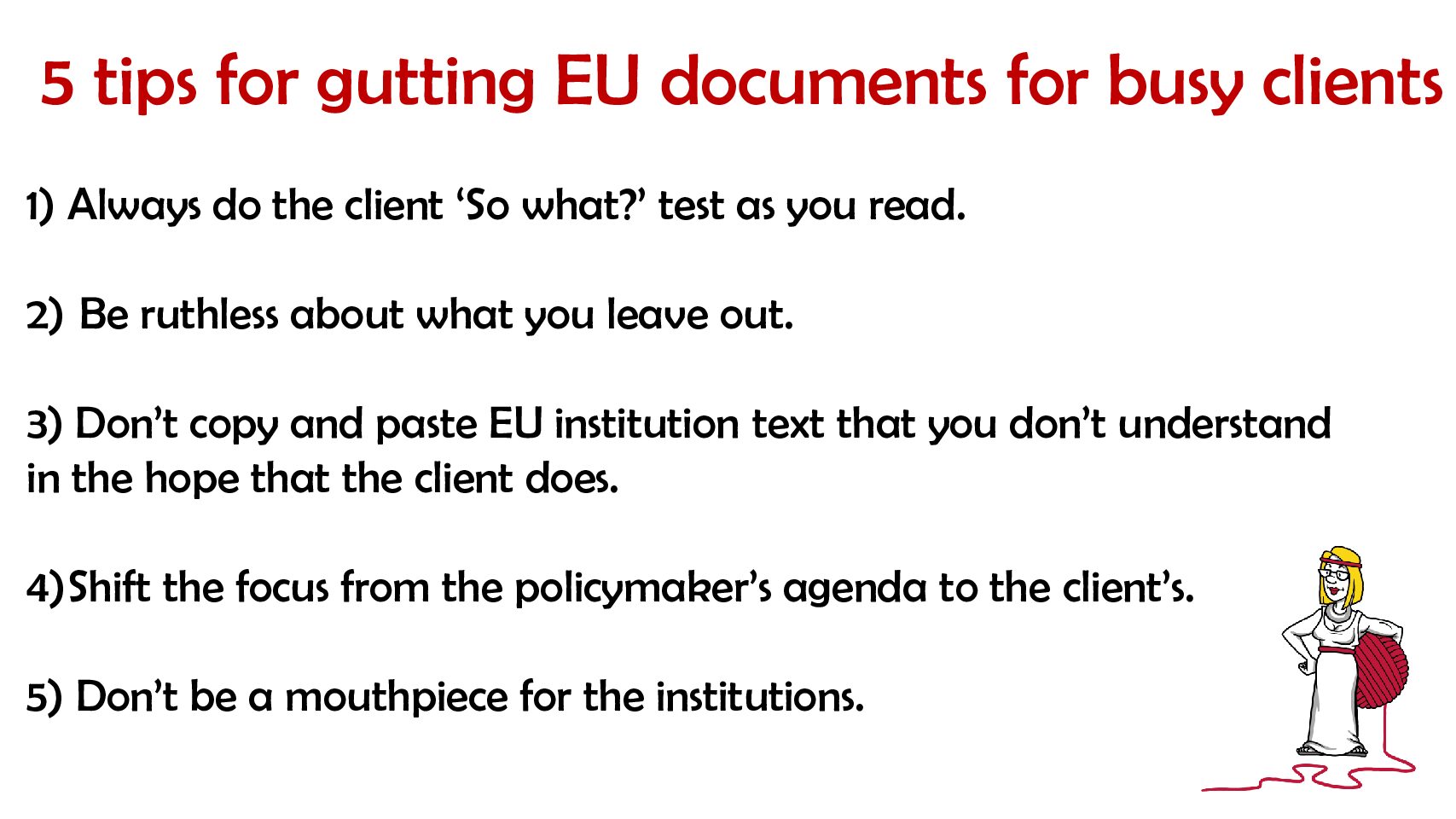
I’ve just finished training a bunch of junior lobbyists on how to quickly scan EU policy documents and pull out the relevant details for their time poor corporate clients.
And no, it’s not simply a case of force feeding the documents into generative AI and telling it to pull out the client-salient bits. I tried prompting ChatGPT and it struggled to do anything beyond summarise. It might get there in time but only if the lobbyists using it already have the judgement to know what they want it to do.
This is because scanning and sifting at speed, as opposed to summarising, requires judgement and deep knowledge of the client’s business.
I’ve trained juniors at various consultancies over my years in Brussels. If I worked permanently at one, here are the guiding principles/short cuts I would give interns and juniors to help them develop good drafting habits as soon as they start.
1. Do the ‘so what test’ as you read
Always ask yourself: what is the one question going through my client’s head while they read my emails/policy updates? Without fail, it is almost certainly a variation of: ‘How will this new development affect my business?’
And that is basically it.
While your direct contact at the client may well be the head of EU public affairs, they will often be sharing what you send them more widely within the company. This means you shouldn’t assume interest in, let alone deep knowledge of, the EU among their internal audiences beyond what a specific policy development means for the bottom line.
2. Be ruthless about what you leave out
Only include information that helps answer the first question from the above point. The EU institutions produce huge amounts of text, much of it irrelevant for your client. This means you don’t’ have to treat the documents as stone tablets from Mount Sinai that must be revered as something sacred. In fact, it’s better if you don’t. The client almost certainly won’t need most of the stuff that’s in them. And, unlike your teachers at university, they aren’t paid to read what you produce.
It takes confidence and skill to discard large swathes of irrelevant text but your clients will thank you if you can cut 30 pages down to three relevant paragraphs. Yes, this is hard. There is a reason why you get paid more and have a more senior job the fewer words you produce.
3. Don’t copy and paste text that you don’t understand into the client email/update
This should go without saying. But it happens, mostly because juniors blame themselves when they don’t understand something or assume the client will. Sometimes the institution press releases help but not always.
If you suspect an incomprehensible provision might be important, include it but explain that the text itself is unclear and that you are seeking clarification. If you let it go through, there is a good chance that the client will ask you what it means and if you can’t tell them then it could affect your credibility.
Remember, it’s not your fault if someone else can’t or won’t write clearly. And passing on incomprehensible text verbatim perpetuates the Emperor’s New Clothes phenomenon, whereby everyone in Brussels feels huge pressure to say they understand everything when they often don’t.
As a benchmark, I regularly ask heads of trade associations if they understand everything that comes out of the EU institutions. And I am usually met with snorts. Enough said. Time to channel your inner snorter.
This is basically a back door way of saying use plain language, even if the institutions often don’t.
4. Shift the focus to the client and away from the policymaker
Move the focus away from abstract legal provisions to any potential impact for the business. And make it client, not EU-centric. This means you will have to tweak some of the provisions (not copy them) with the client (not the law) as the focus.
For example, instead of:
‘The Directive will introduce stricter requirements for obtaining individuals’ consent for data processing activities. There will also be enhanced data breach notification obligations, necessitating prompt reporting of any data breaches.’
TRY: ‘Under the Directive companies, including Agri-Tech Company X, will face stricter consent requirements on how they obtain and process an individual’s data. They will also have to report data breaches as soon as they happen’.
5. Don’t be a mouthpiece for the institutions
You don’t have to parrot the EU’s policy agenda verbatim to the client. While it is important to give context or explain the aim of the legislation, you don’t need to take it at face value and amplify it.
For example, ask yourself: does the CEO of Agri-Tech Company X sitting in Arkansas really need to know that the EU Cybersecurity and Data Protection Directive is part of the Commission’s ‘Unwavering commitment to safeguard privacy and fostering fundamental rights in the digital age’?
No, no he almost certainly does not.

Comments
Mike Pitts
June 28, 2023"the CEO of Agri-Tech Company X" might be a woman - I realise in Arkansas probably not but....